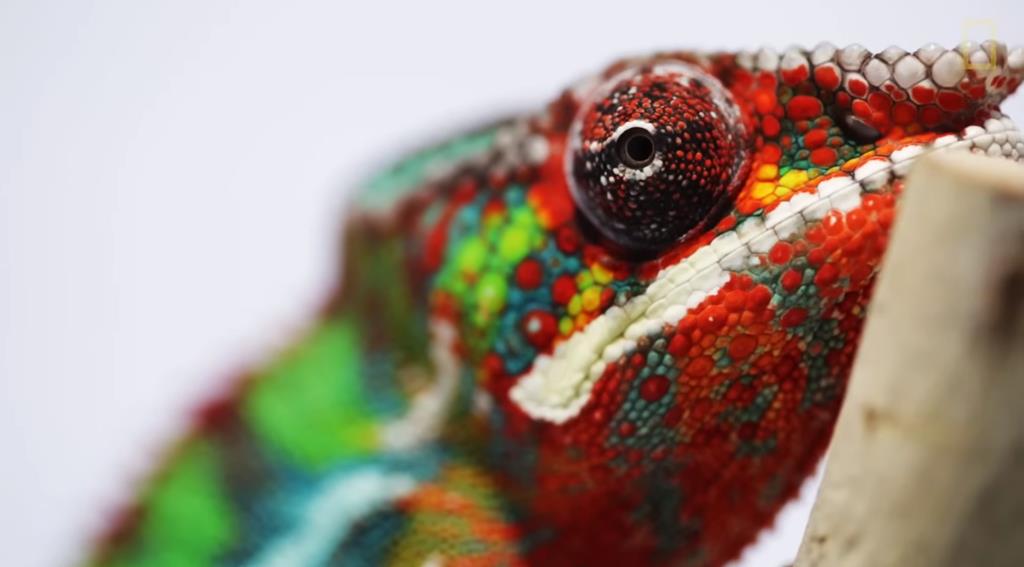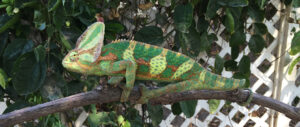If a chameleon bites you, it is usually not serious. A chameleon’s bite typically results in minor pain and small, superficial skin marks.
Chameleons are not known for being aggressive creatures, but when they do bite, it’s important not to panic. Their relatively weak jaws and small, non-venomous teeth cause minimal harm to humans. Understandably, pet owners and enthusiasts might worry about the consequences of a chameleon bite.
While their defense mechanism is mainly for capturing prey or warding off threats, a bite may occur if the chameleon feels threatened or is mishandled. Such bites rarely necessitate medical attention beyond basic first aid, like cleaning the bite area with soap and water. However, ensuring that the chameleon is handled properly and stress-free will minimize the chances of it resorting to using its bite defensively.
Chameleons At A Glance
Captivating creatures of color and camouflage, chameleons spark widespread curiosity. These reptiles stand out in the animal kingdom. People often ask about their bites. Are they harmful, painful, or just a myth? First, let’s explore what makes chameleons so interesting.
Physical Characteristics
Chameleons are renowned for their vivid colors and pattern-changing skills. Their skin changes color for communication and temperature control. Most have prehensile tails, clutching branches firmly. Their zygodactylous feet are perfect for gripping. Uniquely, each eye can pivot independently, allowing 360-degree vision.
- Ocular bulbs rotate to scan for insects, their main food.
- Long tongues shoot out to catch prey from a distance.
- Skeletal structure is distinct, with a casque on the head of some species.
Habitat And Behavior
Chameleons predominantly live in forests and bushes. Some prefer arid environments. Their habitats span from rainforests to deserts, making them versatile residents.
- They are mostly tree-dwelling, finding safety and food in foliage.
- These creatures are solitary, except during mating seasons.
- They rely on stillness and stealth to avoid predators and catch prey.
When threatened, chameleons don’t often bite humans. If a chameleon does bite, it’s typically as a last resort. Knowing these aspects of their nature helps understand chameleon behavior in captivity and the wild. Let’s discover what truly happens if a chameleon uses its bite in defense.
Chameleon Bite: Reality Check
Chameleons are fascinating creatures known for their color-changing abilities. Many think these little reptiles are harmless, but they can bite. This section explores what happens when a chameleon decides to use its teeth.
Frequency And Causes
Chameleon bites are not common. These creatures prefer to hide rather than attack. Look at some reasons these calm reptiles might bite:
- Fear or self-defense
- Mistaking fingers for food
- Stress or illness
- Protecting their territory
Understanding these causes can help prevent bites.
What A Bite Feels Like
Curious about the bite? It’s more scary than painful. A chameleon’s bite may surprise you but it’s rarely dangerous:
- Lacks venom
- Could pinch but not severely injury
- Might leave a mark or small bruise
Calm handling and respect for the chameleon’s space reduce the risk of a bite.
Medical Implications Of A Chameleon Bite
Curious about the Medical Implications of a Chameleon Bite? Rare though they may be, it’s essential to understand the possible effects of a chameleon’s bite on human skin. Let’s delve into what happens if you find yourself on the receiving end of those tiny jaws.
Bite Wound Assessment
Identifying the severity of a chameleon bite is the first step. Typically, these bites cause minimal damage due to the chameleon’s non-venomous nature and small teeth. Signs to look for include:
- Redness
- Swelling
- Pain at the bite site
Infection Risks
While the bite itself may be mild, infection is a concern. Chameleons might carry bacteria in their mouths. Look out for:
- Increased pain
- Red streaks spreading from the wound
- Fluid or pus draining from the bite
Treatment And First Aid
Immediate care can prevent complications. Follow these First Aid steps:
| Step | Action |
|---|---|
| 1 | Clean the wound with soap and water. |
| 2 | Apply an antiseptic. |
| 3 | Use a sterile bandage to cover the area. |
| 4 | Monitor for signs of infection. |
In case of severe reactions or infection, seek medical attention promptly.
Debunking Chameleon Bite Myths
Welcome to the surprising world of chameleons, where colors shift and tongues whip with astonishing speed. In this post, we dispel myths about chameleon bites. Often portrayed as harmless creatures, it’s rare for chameleons to resort to biting. Yet, misconceptions linger. Let’s unravel the truth about chameleon bites.
Myth Vs. Fact
Discussing chameleons and their biting habits brings up much confusion. Are these bites dangerous? Can they be venomous? A closer look at the facts helps separate reality from fiction.
Common Misconceptions
- Chameleons are venomous: False! These reptiles do not carry venom.
- Chameleons bite often: Incorrect. They are shy and prefer hiding over aggression.
- Bites cause serious harm: Not quite true. They might startle, but rarely cause major injury.
| Myth | Reality |
|---|---|
| All chameleon bites are painful. | Many hardly feel; some might pinch. |
| Chameleons attack people often. | They’re passive, biting mostly when threatened. |
Beyond light discomfort, a chameleon’s bite typically poses no threat to humans. They use biting merely as a defense mechanism. Clean the area and apply basic first aid if bitten. Always handle chameleons—and indeed, all animals—with care and respect.
Handling Chameleons Safely
Chameleon owners sometimes worry about bites from their colorful friends. Bites are rare and usually not serious. Yet, knowing how to handle these creatures is key. Safe handling can prevent bites and stress for both the chameleon and owner.
Proper Handling Techniques
- Approach from the side, not above, to avoid seeming like a predator.
- Let the chameleon come to you rather than grabbing it.
- Support their feet at all times with your hand or arm.
- Move slowly to keep them calm.
- Limit handling to short periods as they are not fond of frequent interaction.
Reducing Stress And Agitation
Stress can cause a chameleon to bite. A calm chameleon is safer. Keep their environment quiet and peaceful. Offer places to climb and hide. Recognize signs of stress: dark colors, hissing, or body flattening. Give them space if they show these signs. Regular, gentle handling builds trust and reduces stress over time.
When To Seek Professional Help
Chameleon bites are typically harmless. Chameleons are not venomous, and their bites are not known for causing serious health issues. However, some situations warrant professional medical attention. Knowing the signs of complications is crucial for your health and safety.
Signs Of Serious Complications
Watch for certain signs post-bite that may indicate a problem:
- Persistent pain beyond a few hours
- Redness or swelling that spreads at the bite area
- Development of puss or discharge from the wound
- Fever or chills suggesting an infection
- dizziness or nausea
If any of these symptoms arise, it’s important to take immediate action. Seek medical help to avoid further complications.
Consulting A Healthcare Provider
If you’re experiencing problematic symptoms, contact a healthcare provider. Be ready to tell them about the bite:
| Time of Bite | Symptoms | Bite Appearance |
|---|---|---|
| When the chameleon bit you | Any unusual feelings since the bite | Color, size, and condition of the bite area |
Your healthcare provider will likely recommend an appropriate care plan. Follow their advice closely to ensure a speedy recovery.
Frequently Asked Questions On What Happens If Chameleon Bite?
What If A Chameleon Bites You?
If a chameleon bites you, wash the area with soap and water. Observe for signs of infection, such as redness or swelling, and seek medical attention if needed. Chameleon bites are generally non-toxic and pose little risk to humans.
Is Chameleon Poisonous To Humans?
Chameleons are not poisonous to humans. They don’t produce toxins harmful to people. Handling them safely poses no venomous risk.
Can Chameleon Give You Disease?
Chameleons can potentially transmit diseases to humans, such as salmonella. Always practice good hygiene, like washing hands after handling to reduce the risk of infection.
Do Chameleons Have Rabies?
Chameleons, like most reptiles, do not carry rabies. This disease primarily affects mammals, and reptiles have a different physiology making them resistant to the virus.
Conclusion
Understanding the effects of a chameleon bite helps pet owners and enthusiasts stay informed. Fortunately, these bites are rarely hazardous to humans. Always maintain proper handling techniques to avoid stress-triggered bites. By doing so, both you and your colorful companion can enjoy a safe, happy coexistence.

